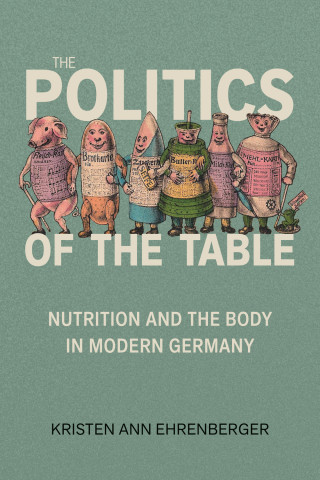
Reviews
This beautifully written book explores the entanglements of German nutrition science and politics from the 1890s through the interwar years. Ranging from the inside of the body to cookbooks and food programs, it shows how biological thinking about digestion influenced everything from national policy to family dinners, and vice versa.
Kristen Ehrenberger documents the first moment in which 'healthy' food became politics, improving the public's health but also to play into fantasies of breeding and maintaining better warriors for the new state. The link between scientific medicine and the claims of food science in the late 19th century in Germany echo through the trenches of WWI and then into the fantasies of the new German in the Third Reich. Food is power, as this brilliantly written study shows, especially when the goal was to 'Make Germany Healthy Again.'
Timely, fascinating, and thought-provoking, The Politics of the Table shows how bodies have mattered in the past and why they matter now. By tracing the complex politics of food in modern Germany, Ehrenberger (MD/PhD) positions her work in the exciting intellectual space where medicine and the humanities intersect. Highly recommended!
The Politics of the Table is a theoretically astute and engagingly written historicization of a crucial question – when and why did governments start to care about what people ate? Ehrenberger not only traces how this happened, but also suggests the cultural and political implications of this new space of government regulation.
Book Details
List of Illustrations
List of Tables
Preface: The Menu
1. Introduction: Bodies that Eat and Drink
Part I: "The Kitchen is the Laboratory of the Housewife": The Circulation of Nutritional Science, 1890
List of Illustrations
List of Tables
Preface: The Menu
1. Introduction: Bodies that Eat and Drink
Part I: "The Kitchen is the Laboratory of the Housewife": The Circulation of Nutritional Science, 1890–1930
2. From Calories to Vitamins: Nutrition in the Laboratory
3. Feeding the Sick: Nutrition and Authority in the Sick Room and the Clinic
4. Under the Hygiene Eye: Nutrition at the German Hygiene Museum
5. How to Cook Your Vegetables: From the Factory to the Kitchen
Part II: "The Cooking Spoon is the Scepter of the People's Health": Nutrition & World War I
6. "More Than Bitter": The Blockade and Rationing in Saxony and Bavaria
7. "I Am Not a Taste Barbarian": Food and the Senses during World War I
8. Cooking Out but Eating In: The Politics of the Family Table during World War I
9. From the Kitchen to the Bedside: Sick Rations in Germany during World War I
10. Conclusion: Nutritional Knowledge and Ignorance in the Third Reich
Bibliography
Index





